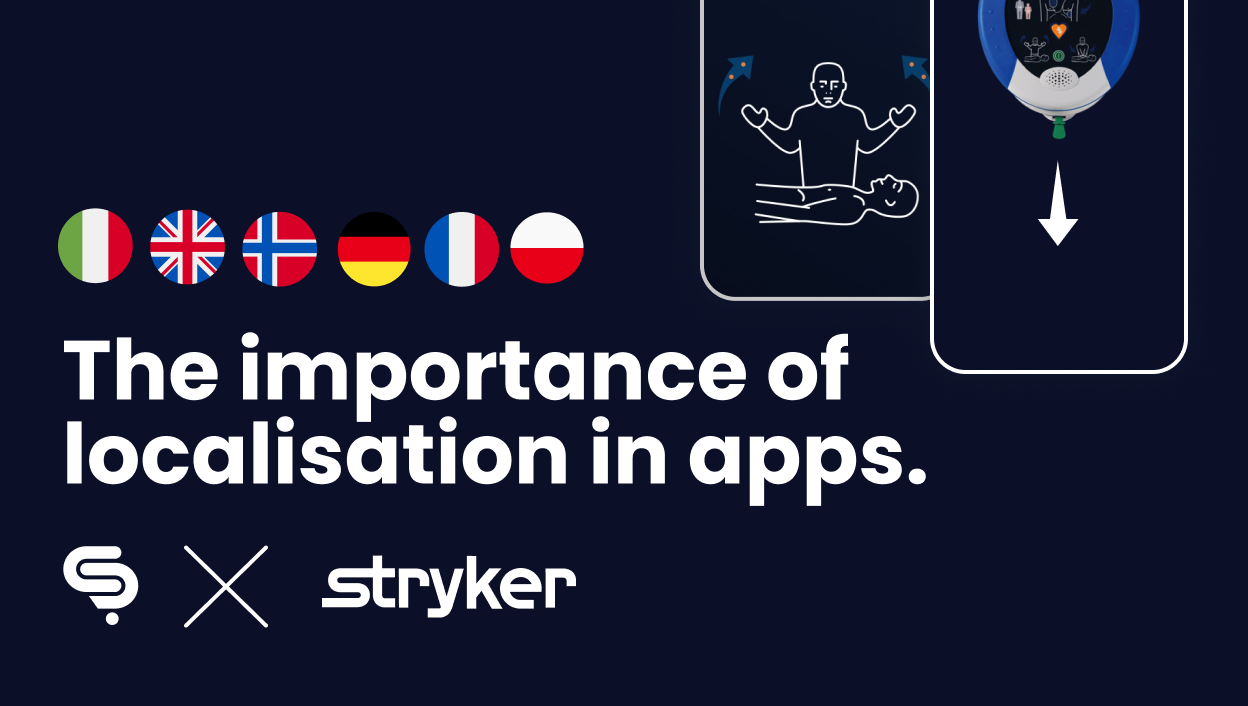Watch your language: The importance of localisation in apps.

We have recently deployed an update for our valued client, Stryker in order to better support even more audiences, and one of the main updates has been a further app localisation element to support Polish speakers in the messaging and audio content within the app.
The Stryker App has 35 localised language functions and counting...
App of the Year Winner 2022 - Stryker app is a Medical training application for companies that provide training on safe and effective use of AEDs. In this application, the delivery of clear and easy to understand instructions is time critical as every second in a resuscitation event depends on safe and competent use of AEDs as part of life saving procedures.
The fundamental case for app localisation
In adding this update we decided that this was an important opportunity to more broadly introduce the importance and key benefits of app localisation.
From the very beginning, a fundamental aspect of this mobile app project was the recognition that the app's effectiveness hinged on its comprehensibility in all languages spoken or utilised in regions where the AED Unit was available. Failing to incorporate multi-language support would essentially jeopardise lives if individuals couldn't fully grasp the instructions, a risk that Stryker intended to avoid for its diverse user base.
While it is certainly only a smaller number of use cases that could pose threat to life or might lead to physical injury, nevertheless the broader business world needs to be able to reach a global audience for maximum engagement, usage and productivity.
What this means is that all custom software and mobile apps need to be localised and adapted to different languages and cultures as the user base grows and the demands for such app localisation arise.
This can be a complex and time-consuming process, but in truth right from the design briefing stages, businesses that plan for their apps and software to be successful and effective in global markets need to have this in the road map.
Here are a few of the benefits of app and software localisation:
Effective understanding of app interface and messaging
Just as in the case mentioned above, there is an important need for all mobile app messaging and content to be consumable and understandable by ALL intended audiences and the costs of not doing so can affect engagement, productivity, conversions and revenue.
Boost Sales
App and custom software localisation can help you boost sales by making your software and apps more accessible to a wider audience. This is especially important for businesses that are selling products or services online in specific global regions.
According to a study by Common Sense Advisory, 75% of online shoppers are more likely to buy from a website that is in their own language. The study also found that localised websites generate 10% more sales than non-localised websites.
Reach a wider audience
By localising your software and apps, you can reach and engage with a wider audience of potential customers. This is especially important for businesses that are targeting emerging markets.
Improve the user experience
When users are able to interact with your software and apps in their own language, they have a better experience. This can lead to increased satisfaction and loyalty.
Build trust and credibility
When you localise your software and apps, you show commitment to providing a high-quality product or service to your customers, regardless of where they are accessing the App. This builds trust and credibility with your loyal audience.
When we consider that global competition is growing and there is greater and easier access of cheaper imported goods, businesses that do not consider both localization and how it affects their customers are at great risk of losing business revenue.
It was reported in the “Can’t Read, Won’t Buy – B2C,” report by CSA research:
…given the choice between buying two similar products, 76% of respondents will choose the one with information in their language. This number jumps to 89% of those with no English-language competence.
Should you consider moving the language chooser for your mobile app from a "nice to have" feature to a priority by the time you finish reading this article?
If you want to know more about app localisation strategies and smart functionality when publishing your software and app projects in multiple languages, get in touch with us and have a chat with the team.